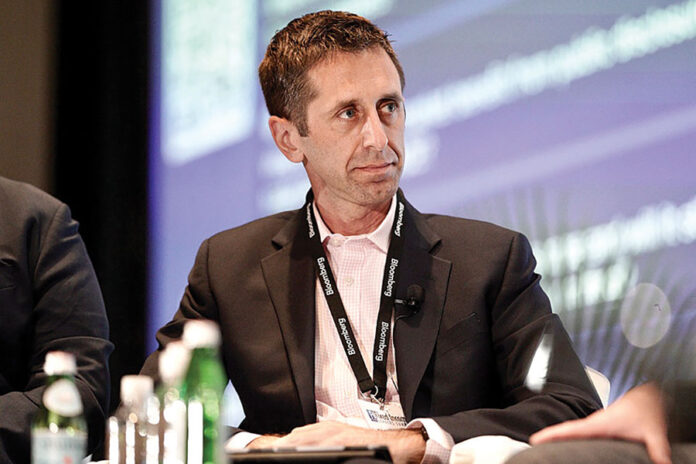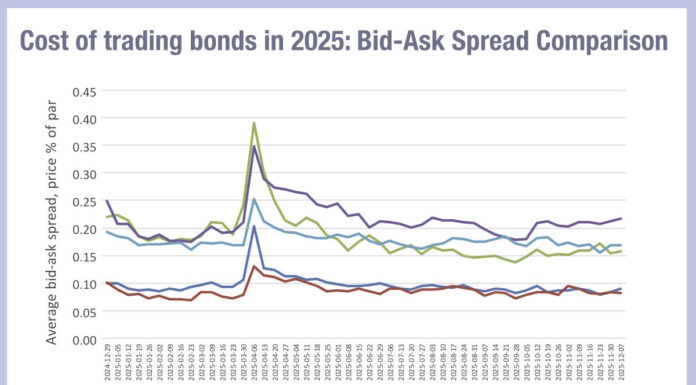Muni traders view electronic trading expertise as the most important skill set to add to the desk in 2025, according to a recent report from Coalition Greenwich – but e-trading has accounted for an average of just 20% of notional volume over the last two years.
The paper reports that although muni bond e-trading has been on an upward trajectory, reaching a peak of 21% in Q4 2023. In 2024, it has not broken the 19% mark.
The shift towards e-trading and automation is proven by the reduction in average trade sizes, Coalition Greenwich stated, which have dropped by a third to US$232,000 year-to-date October 2024.
Despite fairly slow growth, the majority of survey participants believe that e-trading will increase over the next year; two-thirds by 5% or more, and almost a third by between 1 and 5%. A single participant predicted that its share of the volume would remain stagnant.
In light of this, 48% of respondents stated that e-trading expertise was the most important skill to add to the trading desk in 2025; followed by sector expertise (37%), data management expertise (31%) and coding expertise and relationship management (both 29%).
Equally, 49% believe that automating elements of the trading process is their top technology priority for the year ahead. Just 26% named additional liquidity access as a priority, a result in line with improving liquidity in the market. Almost half (46%) of participants reported that the situation has improved in relation to long-term averages, and just 17% believe the market has declined.
On the sell side, 70% of respondents stated that e-trading enables businesses to scale. A further 40% believe that it improves client relationships. However, an equal quantity worry that it advantages bigger banks and nonbank liquidity providers who have budgets and balance sheets that can increase volume.
“While the muni market will become more digital as the world and capital markets have over the past 30 years, solutions for the muni market’s inefficiencies can’t be cut and pasted from other parts of the bond market,” warned report author Kevin McPartland, head of research for market structure and technology. “Thankfully, banks, nonbanks, investors, trading venues, and fintech firms alike have largely grasped this reality and are moving the market toward a positive path forward.”
Nonbank liquidity providers (NBLPs) are a growing presence in muni markets, after being more broadly active in other areas of fixed income such as corporate bonds and US Treasuries. Their impact has been broadly positive, according to survey participants.
More than half (60%) of participants stated that these providers improve liquidity, compared to 11% who believe that they harm it. A further 37% and 14% believe that they encourage banks to improve their technology and liquidity provision respectively. However, NBLPs are seen to be creating more volatility by almost a third of the market (31%), compared to just 14% who believe they reduce it.
A changing market
Coalition Greenwich’s research suggests that the increase in muni ETFs has helped to bring new liquidity providers into the market and improved overall liquidity, along with helping institutional investors to gain exposure. However, almost half of respondents (48%) argue that ETFs are bringing new risks to muni markets during stress. Regardless, 91% expect their use to grow in the market in 2025.
Separately managed accounts (SMAs) are also a growing market presence, with 94% of those in the market expecting their trajectory to continue. “The management of these accounts cannot be fully automated yet, but AI-driven portfolio analytics, coupled with fully electronic portfolio trading, are making an automated future increasingly possible,” said McPartland.
By contrast, a reduction in the use of open-end mutual funds is anticipated by 48% of respondents. For closed-end mutual funds, this figure rises to 52%.
Looking ahead, the chief concerns for muni market participants are changes to the bond’s tax exempt status and excessive government spending. These worries emerge in light of the US budget deficit and the suggestion that taxation in this space could boost revenue. “Without the tax exemption, munis could get lost in the bigger sea of fixed-income investments and lose some of their allure,” McPartland observed.
©Markets Media Europe 2024
©Markets Media Europe 2025










